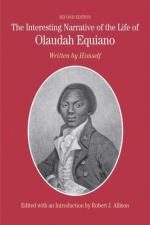Even in Barbadoes, notwithstanding those humane exceptions which I have mentioned, and others I am acquainted with, which justly make it quoted as a place where slaves meet with the best treatment, and need fewest recruits of any in the West Indies, yet this island requires 1000 negroes annually to keep up the original stock, which is only 80,000. So that the whole term of a negro’s life may be said to be there but sixteen years![T] And yet the climate here is in every respect the same as that from which they are taken, except in being more wholesome. Do the British colonies decrease in this manner? And yet what a prodigious difference is there between an English and West India climate?
While I was in Montserrat I knew a negro man, named Emanuel Sankey, who endeavoured to escape from his miserable bondage, by concealing himself on board of a London ship: but fate did not favour the poor oppressed man; for, being discovered when the vessel was under sail, he was delivered up again to his master. This Christian master immediately pinned the wretch down to the ground at each wrist and ancle, and then took some sticks of sealing wax, and lighted them, and droped it all over his back. There was another master who was noted for cruelty; and I believe he had not a slave but what had been cut, and had pieces fairly taken out of the flesh: and, after they had been punished thus, he used to make them get into a long wooden box or case he had for that purpose, in which he shut them up during pleasure. It was just about the height and breadth of a man; and the poor wretches had no room, when in the case, to move.
It was very common in several of the islands, particularly in St. Kitt’s, for the slaves to be branded with the initial letters of their master’s name; and a load of heavy iron hooks hung about their necks. Indeed on the most trifling occasions they were loaded with chains; and often instruments of torture were added. The iron muzzle, thumb-screws, &c. are so well known, as not to need a description, and were sometimes applied for the slightest faults. I have seen a negro beaten till some of his bones were broken, for even letting a pot boil over. Is it surprising that usage like this should drive the poor creatures to despair, and make them seek a refuge in death from those evils which render their lives intolerable—while,




